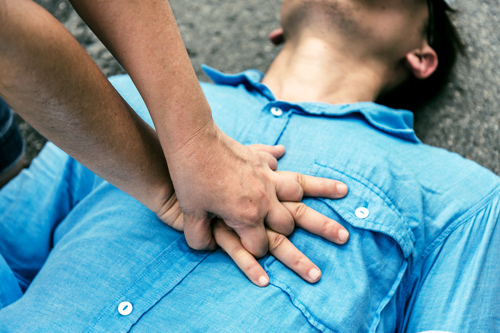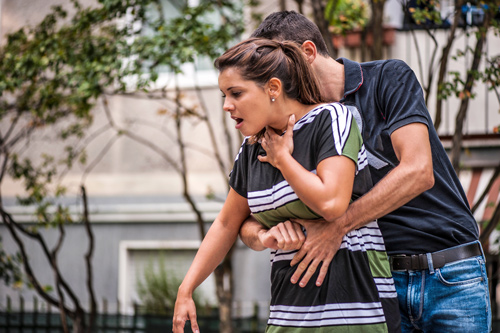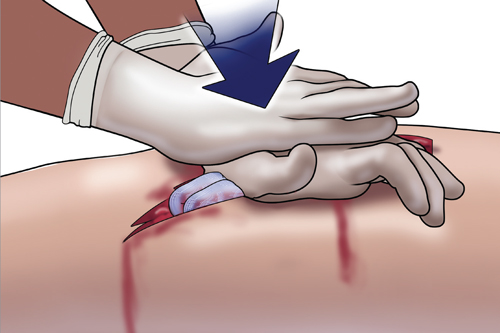National Preparedness Month
- Get Prepared
- Emergencies
- Current: National Preparedness Month
September is National Preparedness Month
Governor's Proclamation
National Preparedness Month is recognized each September with the purpose of promoting family and community disaster planning. It is the perfect opportunity for Hoosiers to learn lifesaving skills, how to check insurance policies for common hazards and how to make and practice household emergency plans. Tornadoes, fires, snow and severe flooding are common occurrences to Hoosiers. Knowing how to stay prepared for these types of situations will not only minimize the effects, but also save lives. This year, learn the importance of creating a family emergency communications plan, assembling a disaster preparedness kit and identifying the different types of disasters that can happen locally.
Disasters can strike at any time, so during National Preparedness Month, IDHS encourages all Hoosiers to create or revisit their emergency planning and preparedness plans. You should:
- Learn basic first aid skills.
- Make a plan.
- Build a disaster kit.
- Know what to do in different types of common disasters or hazardous situations.
Learn Basic First Aid
First aid is immediate medical attention after an injury at the location where the incident occurred. Sometimes, first aid can be as simple as cleaning a minor cut, scrape or scratch. Other times, serious injuries or conditions require significant action to save a person's life.
That is where you come in.
Depending on where and when an injury occurs, professional medical help could be several minutes or possibly hours away. Time is of the essence for major injuries or adverse health conditions like cardiac arrest, so IDHS encourages Hoosiers to learn basic first aid skills so you can start lifesaving actions as soon as possible, even before emergency medical responders arrive.
General Tips
- In general, Indiana's "Good Samaritan" laws provide immunity to those providing emergency care at the scene of an emergency or accident to enable Hoosiers to help save a life without worry. Read the laws to learn what is covered.
- One of the best ways to get prepared is to take a class on first aid. Check with the local American Red Cross chapter for upcoming classes.
- Always have a first aid kit in your home and vehicle so you have the right supplies when you need them. The Red Cross recommends several must-have items for your kits.
Cardiac Arrest
If you see someone collapse, or find them unconscious, go up to the person to assess if he or she is OK. Shout, tap the person's shoulder and shout again. If the person is not responding, check for signs of breathing. Slow, deep gasps for air are not normal breathing. If the person is gasping for air, or not breathing at all:
- Call 911.
- Start CPR. Press hard and fast on the center of the chest with both hands, and do this twice every second. More: CPR infographic
- Use an AED, if available. While you are still performing CPR, ask someone to get an AED. Turn it on and follow its instructions. More: AED infographic
- Continue to do CPR until emergency medical responders arrive. Take turns doing CPR with someone else, switching every two minutes.
Want to take a CPR class? The Indiana Department of Education has a list of approved CPR providers.
Choking
The elderly and people who are very young are most susceptible to choking. Immediately recognizing when choking is happening and providing help can save a life.
- Signs: One or both hands covering the throat; a look of panic, shock or confusion; an inability to talk or cough; face changing colors to blue or gray
- What to do: Encourage the person to cough and keep coughing. If coughing is not possible, you should perform several back blows and abdominal thrusts.
Stroke
A stroke, also called a brain attack, occurs when blood flow to the brain is blocked or when there is sudden bleeding in the brain. Recovery from a stroke depends on its severity but also how quickly a person receives medical treatment. Every minute counts. Call 911 immediately if you or someone you know may be having a stroke.
Perform the F-A-S-T test to tell if a person is having a stroke:
- Face: Is there weakness on one side of the face? Does one side appear to be droopy?
- Arms: Can the person raise both arms when requested to do so?
- Speech: Is the person easily understood when speaking?
- Time: It is time to call 911 to request medical attention if the person has weakness on one side of the face, cannot raise both arms and is having trouble speaking.
Extreme Blood Loss
Severe bleeding can cause someone to die in as little as five minutes. If you find someone who is spurting blood, has lost part of an arm or leg, has blood-soaked clothing or has bleeding that will not stop, act quickly and remember A-B-C:
- Alert: Call 911 to report the situation and get help.
- Bleeding: Locate the source of the bleeding.
- Compress: Pack or stuff the wound with gauze, a clean cloth, clothing, newspaper or even your hands. Then apply pressure to the wound with both your hands. Press hard and keep your hands there until medical help arrives. Use a tourniquet if available.
More Info
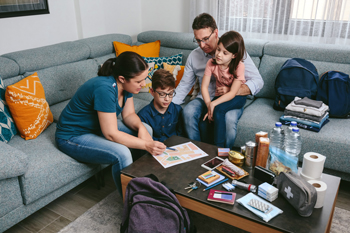

Make a Plan
Making a plan for you and your household is very important. It will keep everyone on the same page and allow everyone to be as safe as possible. Important things to consider include how to communicate, where to shelter and how to evacuate.
For more details, including step-by-step planning information and downloadable forms, visit the Make a Plan page.
Quick Tips
- Choose a location for household members to meet if separated during a disaster.
- Learn how to shelter in place and other types of sheltering methods.
- Develop a plan for when you must evacuate.
- Meet with your family and work on the plans together.
- Remember to plan for pets too.
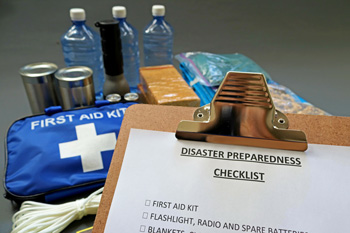

Build a Disaster Kit
All emergencies disrupt your daily routine. But some may make it difficult or impossible for you to return to normal quickly. In these situations, which may affect large numbers of people besides you, you may need to be as self-sufficient as possible to take care of yourself and your household. Having a disaster kit (or multiple sets of kits) ready to go could make all the difference in how well you weather a crisis.
As you assemble items for your kit, keep in mind that your primary goal is basic health and survival. Also, in some cases it may take emergency personnel several days before they can help you.
IDHS recommends you create disaster kits that are designed for at least three days. Each kit should include basic items like water, food, a flashlight, a battery-powered radio and a first aid kit.
For a more detailed list of items for disaster kits, visit the Disaster Kits page.
Must-Have Items
- Water
- Non-perishable food
- First aid kit
- Battery-powered or hand-crank radio
- Flashlight
- Batteries
- Local maps (in case of evacuation)
- Extra clothing
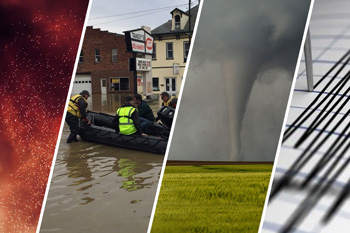

Prepare for Specific Situations
Indiana can experience a wide variety of disasters, both natural and man-made. Research the different disaster risks that can impact your area, or that you could find yourself facing. Thinking ahead about these situations will help you be ready to act, and in some cases may help you decide which insurance coverages to purchase.
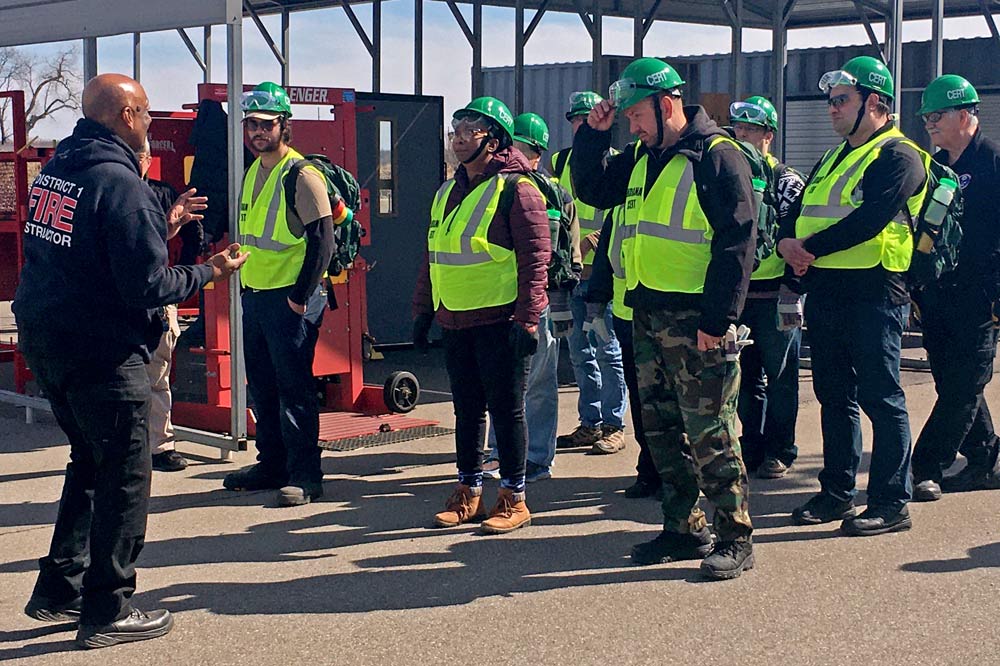
Passionate About Preparedness? Your Community Needs You!
Take an active role in local emergency preparedness by joining a local Community Emergency Response Team (CERT).
CERT members are volunteers in neighborhoods, workplaces and schools who have been trained in basic disaster response skills, including fire suppression, medical operations and urban search and rescue.

